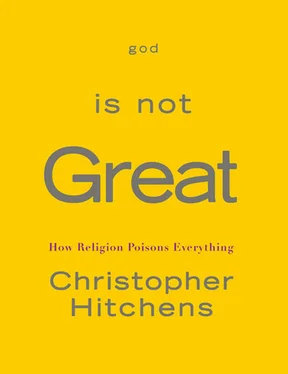In the immortal children’s Christmas pantomime Peter Pan , there comes a climactic moment when the little angel Tinkerbell seems to be dying. The glowing light that represents her on the stage begins to dim, and there is only one possible way to save the dire situation. An actor steps up to the front of the house and asks all the children, “Do you believe in fairies?” If they keep confidently answering “YES!” then the tiny light will start to brighten again. Who can object to this? One wants not to spoil children’s belief in magic—there will be plenty of time later for disillusionment—and nobody is waiting at the exit asking them hoarsely to contribute their piggy banks to the Tinkerbell Salvation Church. The events at which Marjoe was exploited had all the intellectual content of the Tinkerbell scene, nastily combined with the ethics of Captain Hook.
A decade or so later, Mr. Gortner exacted the best possible revenge for his stolen and empty childhood, and decided to do the general public a favor in order to make up for his conscious fraudulence. He invited a film crew to follow him as he ostensibly “returned” to preach the gospel, and took the trouble to explain how all the tricks are pulled. This is how you induce motherly women (he was a handsome lad) to part with their savings. This is how you time the music to create an ecstatic effect. This is when you speak of how Jesus visited you personally. Here is how you put invisible ink on your forehead, in the shape of a cross, so that it will suddenly show up when you start perspiring. This is when you really move in for the kill. He keeps all his promises, telling the film’s director in advance what he can and will do and then going out into the auditorium to enact it with absolute conviction. People weep and yell, and collapse in spasms and fits, shrieking their savior’s name. Cynical, coarse, brutish old men and women wait for the psychological moment to demand money, and start counting it gleefully before the charade of the “service” is even over. Occasionally one sees the face of a small child, dragged to the tent and looking wretched and uncomfortable as its parents writhe and moan and give away their hard-won pay. One knew, of course, that the whole racket of American evangelism was just that: a heartless con run by the second-string characters from Chaucer’s “Pardoner’s Tale.” (You saps keep the faith. We’ll just keep the money.) And this is what it must have been like when indulgences were openly sold in Rome, and when a nail or a splinter from the Crucifixion could fetch a nice price in any flea market in Christendom. But to see the crime exposed by someone who is both a victim and a profiteer is nonetheless quite shocking even to a hardened unbeliever. After such knowledge, what forgiveness? The film Marjoe won an Academy Award in 1972, and has made absolutely no difference at all. The mills of the TV preachers continue to grind, and the poor continue to finance the rich, just as if the glittering temples and palaces of Las Vegas had been built by the money of those who won rather than those who lost.
In his bewitching novel The Child in Time , Ian McEwan gives us a desolate character and narrator who is reduced by tragedy to a near-inert state in which he vacantly watches a great deal of daytime TV. Observing the way in which his fellow creatures allow themselves—volunteer themselves—to be manipulated and humiliated, he coins the phrase for those who indulge themselves in witnessing the spectacle. It is, he decides, “the democrat’s pornography.” It is not snobbish to notice the way in which people show their gullibility and their herd instinct, and their wish, or perhaps their need, to be credulous and to be fooled. This is an ancient problem. Credulity may be a form of innocence, and even innocuous in itself, but it provides a standing invitation for the wicked and the clever to exploit their brothers and sisters, and is thus one of humanity’s great vulnerabilities. No honest account of the growth and persistence of religion, or the reception of miracles and revelations, is possible without reference to this stubborn fact.
IF THE FOLLOWERS OF THE PROPHET Muhammad hoped to put an end to any future “revelations” after the immaculate conception of the Koran, they reckoned without the founder of what is now one of the world’s fastest-growing faiths. And they did not foresee (how could they, mammals as they were?) that the prophet of this ridiculous cult would model himself on theirs. The Church of Jesus Christ of Latter-day Saints—hereafter known as the Mormons—was founded by a gifted opportunist who, despite couching his text in openly plagiarized Christian terms, announced that “I shall be to this generation a new Muhammad” and adopted as his fighting slogan the words, which he thought he had learned from Islam, “Either the Al-Koran or the sword.” He was too ignorant to know that if you use the word al you do not need another definite article, but then he did resemble Muhammad in being able only to make a borrowing out of other people’s bibles.
In March 1826 a court in Bainbridge, New York, convicted a twenty-one-year-old man of being “a disorderly person and an impostor.” That ought to have been all we ever heard of Joseph Smith, who at trial admitted to defrauding citizens by organizing mad gold-digging expeditions and also to claiming to possess dark or “necromantic” powers. However, within four years he was back in the local newspapers (all of which one may still read) as the discoverer of the “Book of Mormon.” He had two huge local advantages which most mountebanks and charlatans do not possess. First, he was operating in the same hectically pious district that gave us the Shakers, the previously mentioned George Miller who repeatedly predicted the end of the world, and several other self-proclaimed American prophets. So notorious did this local tendency become that the region became known as the “Burned-Over District,” in honor of the way in which it had surrendered to one religious craze after another. Second, he was operating in an area which, unlike large tracts of the newly opening North America, did possess the signs of an ancient history.
A vanished and vanquished Indian civilization had bequeathed a considerable number of burial mounds, which when randomly and amateurishly desecrated were found to contain not merely bones but also quite advanced artifacts of stone, copper, and beaten silver. There were eight of these sites within twelve miles of the underperforming farm which the Smith family called home. There were two equally stupid schools or factions who took a fascinated interest in such matters: the first were the gold-diggers and treasure-diviners who brought their magic sticks and crystals and stuffed toads to bear in the search for lucre, and the second those who hoped to find the resting place of a lost tribe of Israel. Smith’s cleverness was to be a member of both groups, and to unite cupidity with half-baked anthropology.
The actual story of the imposture is almost embarrassing to read, and almost embarrassingly easy to uncover. (It has been best told by Dr. Fawn Brodie, whose 1945 book No Man Knows My History was a good-faith attempt by a professional historian to put the kindest possible interpretation on the relevant “events.”) In brief, Joseph Smith announced that he had been visited (three times, as is customary) by an angel named Moroni. The said angel informed him of a book, “written upon gold plates,” which explained the origins of those living on the North American continent as well as the truths of the gospel. There were, further, two magic stones, set in the twin breastplates Urim and Thummim of the Old Testament, that would enable Smith himself to translate the aforesaid book. After many wrestlings, he brought this buried apparatus home with him on September 21, 1827, about eighteen months after his conviction for fraud. He then set about producing a translation.
Читать дальше












